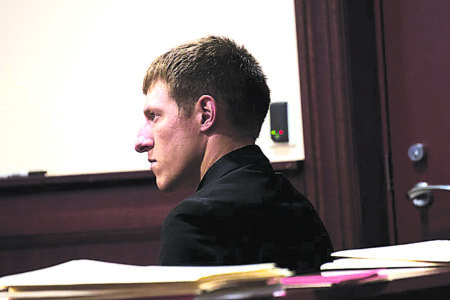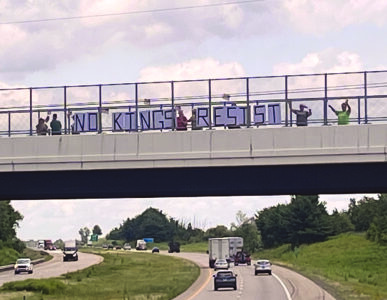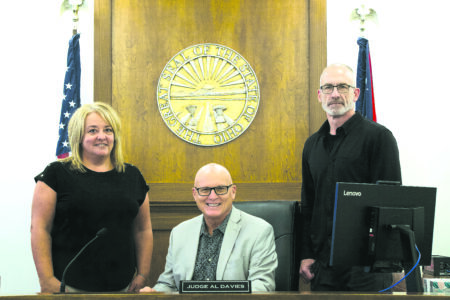Brown pitches more safety measures

STEUBENVILLE — U.S. Sen. Sherrod Brown said residents who watch as a train with as many as 150 cars passes would probably be surprised to learn that often just one engineer is at the controls.
Brown, D-Ohio, explained that in an effort to reduce costs and maximize profits, railroads have pushed for a single crewman to drive freight trains that stretch for 2.5 to 3 miles, even while carrying hazardous or flammable materials.
“This has just got to change,” said Brown who — with U.S. Sens. J.D. Vance, R-Ohio; Marco Rubio, R-Fla.; Bob Casey and John Fetterman, both D-Pa.; and Josh Hawley, R-Mo. — has co-sponsored legislation calling for additional regulations for railroads.
Railroad officials have argued automatic safety mechanisms will stop a train if a problem arises in the locomotive, making it unnecessary for a second crew member, normally responsible for coupling and uncoupling cars at stops, to remain on board for its entire trek.
But Brown said there’s always the risk a lone engineer will suffer from a heart attack or other medical emergency during a long trip.
He said requiring all trains to be staffed by two or three persons is among additional regulations proposed by the Railway Safety Act of 2023, pending legislation Brown said is likely to be challenged by leaders of the railroad industry.
The bill calls for fines for violations to be raised from no more than $225,000 to up to $1 million, or 1 percent of a railroad’s annual operating income.
Brown said the average fine is $10,000, small compared to the billions Norfolk Southern spent in buying back stocks last year.
“Railroad company lobbyists have spent years fighting efforts to make our railroads safer, cutting more than 30 percent of their workers in less than 10 years. Now Ohioans are paying the price,” said Brown at a press conference Tuesday held near the railroad tracks behind the Jefferson County Justice Center.
He said lobbyists have succeeded in weakening regulations for railroads, resulting in an increase in derailments in recent months.
“It shouldn’t take a disaster like that in East Palestine to get railroads to comply with these rules,” said Brown.
He noted the bill establishes procedures for installing and maintaining equipment used to detect overheated wheel bearings, which has been blamed for the Feb. 3 derailment.
Brown was flanked by leaders of railroad trade organizations that support the bill.
Jeremy Ferguson, president of the Sheet Metal Air Rail Transportation’s transportation division, said, “We owe it to the people of East Palestine and all of the communities that have railroad tracks running through them to do the right thing.”
John Esterly, chairman of the Brotherhood of Locomotive Engineers and Trainmen’s Ohio State Legislative Board, said many railroad personnel “are terrified they will be part of the next catastrophe.”
He noted derailments have occurred in recent months in Sandusky, Ravenna, Springfield and in November between Toronto and Steubenville, when multiple units of a 15-car train spilled garbage onto the tracks and Ohio River below them.
Also participating was Tim Young, a Steubenville resident who said he grew up less than 200 feet from railroad tracks and he has family members who still live there.
He asked for legislators to make the contents of trains passing through such areas to be made public.
Brown said he also has introduced legislation that would require railroads to notify local emergency departments when they are transporting hazardous materials through their communities.
The Assistance for Local Heroes During Train Crises Act also would require railroads to establish a fund to reimburse first responders for equipment, overtime and other related expenses.
Asked about training to prepare local personnel for such emergencies, Brown said that’s likely to occur on a regional level.
Alan Shaw, the CEO of Norfolk Southern, said in a statement released Tuesday that the railroad will “support legislative efforts to enhance the safety of the freight rail industry.” He did not address several key provisions of the Railway Safety Act, including increased fines for safety violations and designating trains that carry flammable gas as highly hazardous.
Shaw, who is scheduled to appear in front of the Senate Commerce Committee today, said he supports provisions in the act for railroads to fund training for emergency crews, a review of regulations for rail care inspections every three years and accelerating the phaseout of older tank car models.




